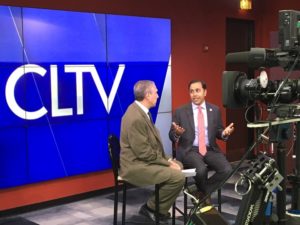After Charlottesville: Overdue Time To Restore Decency To Our Politics

Obstructionism has become the new normal. Ordinary Americans disdain their own representatives, and elected officials distrust their own colleagues.
After Charlottesville, our politics have now borne witness to a U.S. president at times openly defending neo-Nazis and white supremacists before condemning them. As mourners gathered to remember the life of Heather Heyer, who was killed while protesting against hate, the president asserted the moral equivalence of the actions of neo-Nazis and those who opposed them.
This was, perhaps, the inevitable culmination of an increasing ugliness in American politics, which reached a crescendo in the presidential campaign of 2016. Dog whistle appeals to racists and xenophobes substituted for a serious discussion of the economic and social pressures facing millions of hard-pressed Americans.
This type of gin-up-the-base and win-at-all-costs politics has consequences. It makes cooperation and finding common ground almost impossible to accomplish. And this, in turn, has undermined the effectiveness of Congress. Legislating on major issues has ground to a halt. Obstructionism has become the new normal. Ordinary Americans disdain their own representatives, and elected officials distrust their own colleagues.
In the past, leaders of both parties have been able to reach across the partisan divide. They succeeded by retaining their own humanity and recognizing the same in their political opponents. They embraced a sense of decency in their lives and politics that is often missing today.
The stories of our most successful legislators contain common elements of compassion, kindness and trust: the congressman who prayed at the bedside of the nearly-slain president of the opposite party and went on to forge an historic partnership with him; the senators who rallied across the aisle to the cause of suicide prevention after a fellow senator’s son took his own life; an alcoholic congressman who sponsored an alcoholic senator from the opposite party as he took his first steps toward sobriety.
Moreover, these rivals, who managed to put aside partisanship, passed landmark legislation: the Americans with Disabilities Act, the Mental Health Parity Act, the Child Safety Act, and the Violence Against Women Act – some of the most transformational laws in recent history. Through collaboration, these politicians did what somehow seems impossible today: they reached across the aisle with civility and compassion and found common ground.
Perhaps the bipartisan revulsion at President Trump’s defense of white supremacists provides an opportunity for members of Congress to rediscover our own compassion and sense of decency. Perhaps it will enable us to look at our political opponents not as “bad” people, but as fellow Americans equally committed to eradicating the hatred and division that has come to characterize our cable news-driven politics.
The truth is that searching for our commonality instead of our differences could transform our dysfunctional politics. President Teddy Roosevelt recognized this, saying that “the most practical kind of politics is the politics of decency.” The true heroes of American democracy are those who have rejected partisanship and pedantry and, usually out of the spotlight, accomplished what democracy was designed to do. By making friends and sharing confidences, these men and women poured their humanity into their lawmaking for the good of our country and its citizens.
In some ways, “decency” is a hazy concept; we know it when we see it. We are uplifted by stories of decency ― especially in politics, so often fraught with ambition and ego-driven competition. When the norm is decency, other virtues can thrive: integrity, honesty, compassion, kindness and trust. Relationships are stronger so politicians are more apt to work across the aisle. Rhetoric is less divisive, coalitions are more diverse, and dialogue is more frequent. In some ways, political decency is a sign of a healthy democracy, but in other ways it is the cause of it. Whichever the starting point, decency unites, it inspires, it brings out our strengths and shores up our weaknesses.
Our political system has been bankrupted by the failures of Congress to act in ways that give meaning to the struggles our constituents endure every day. We must reject the politics of meanness and contempt that increasingly dominate our airwaves and Internet. This will require us to recommit ourselves to a mission of service ― with integrity, compassion, kindness and trust as our guides. A shared determination to pursue a politics of decency would be an appropriate answer to the shame of Charlottesville ― and our president’s indecent response.
